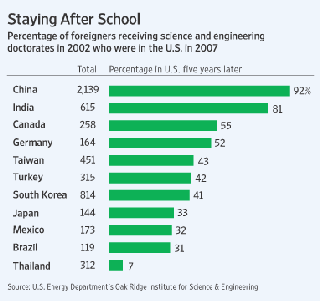Is The Reverse Brain Drain Really Happening?
Brain Drain has been one of the prime reasons why India has not been able to establish itself as an R&D hub. We pat our back on being the Outsourcing giants and expanding India’s global footprint. However, ever since 26/11 happened and later with the U.S. economy recession, a new trend was cited to be emerging-Reverse Brain Drain.
A major feature of which was that Foreign Students in the U.S. especially from India and China are keen to return to their native countries and contribute.
It is heartening to know since Reverse Brain Drain is a boon to any developing country like India. We get access to our own people who have been trained in one of the best institutes in the world.With their qualifications and international exposure, it is no doubt that they can contribute to the nation.
However, it still remains a little sketchy if the reverse brain drain is indeed happening.According to WSJ , the foreign students holding Ph.D.s are indeed staying in the U.S. after completing their degree.According to the released data,
62% of foreigners holding temporary visas who earned Ph.D.s in science and engineering at U.S. universities in 2002 were still in the U.S. in 2007.
Of those who graduated in 1997,60% were still in the U.S. in 2007.
Now, post the 26/11 it has been expected that the number of Ph.D.s willing to stay back in U.S. declined after the 26/11 attacks but has rebounded and it is expected to rise.Foreign nationals account for more than 40% of the total Ph.D candidates in the U.S. and there has been an 8% increase in the same in the 2009.
Img Source
There has been a lot of reverse brain drain in the middle management levels where 35 something managers have relocated to India.Now, this no doubt is a promising trend but for us to become the next R&D destination, we need creators more than the managers.We need top of the class Ph.D researchers who can foster innovation and creation.If this data seems to be correct, the Ph.D crowd ain’t coming back to the native country.
As much as I would like to support the reverse brain drain, I am going to play the devil’s advocate here.The Ph.D.s and the master degree holders will need access to state of the art laboratory infrastructure.Now, until we can create a conducive platform for them to deliver results, how do we expect them to relocate to India.There is a serious dearth of quality education/research institutes and even though infrastructure is being ramped up , it still is below par.It’s worrisome that a premier education body of the stature of IIM is finding it difficult to maintain its standards in its new branches.
Yes, we need the Reverse Brain Drain to happen but we need the right platform to leverage the expertise and the skill set of those individuals.A razor sharp focus on providing the required infrastructure and a dedicated financial support for supporting R&D investments will go a long way in increasing the reverse brain to a great extent.
What do you your thoughts on this? Will we see an increasing trend of Ph.D degree holders from abroad making the journey back home.



Yes indeed the institutions of India (universities, gvt labs, etc…) need to offer suitable “nests” for those Indian brains that were trained abroad, but this is also in the hands of corporates : India Inc., having banked heavily on becoming an outsourcing hub, has perhaps done too little so far to develop new technologies from scratch, or at the very least completely new products based on leading edge technologies.
As a result, barring a few visionary businesses that design and implement bold strategies, Indian companies, in the global context, are still often acting as followers instead of fighting for global leadership.
Quite naturally, it is difficult for a top scientist or executive to strive in an organisation that is too shy in the objectives it sets for itself. Fortunately this is slowly changing – in part thanks to greater pride and confidence in the country – but it will take time for India to offer similar opportunities, within companies, as are available abroad. Hopefully, the first returning brains will also participate in accelerating the trend.
Benoit Teppe
Managing Director
InAlliance Consulting,
Capability acquisition and market entry consultants
http://www.inalliance.eu/
Not sure you meant 26/11 (Mumbai) there, I feel the references are more appropriate for 9/11 (New York) actually.
Thanks for pointing out Atul! It should have been 9/11 , l try to get it updated
Its good and bad. Its bad, because that means there will lesser savings and foreign currency coming in. Well, that’s the only one I can think of!
On the good side, I can think of many positives. Most importantly the education and experience of the people returning to India will be valuable, not because it is ‘American’ or foreign, but because it comes with the exposure gained by working with people from diverse cultures and possibly cutting edge technology or thinking.
Ankit, like you have rightly pointed out the platform, infrastructure and also renumeration has to be there to feed the reverse brain drain. Or else, people might return to India reading all the ‘India Shining’ articles, seeing GDP growth figures and thinking they can strike gold here, but soon may be disappointed.
Regarding the reverse brain drain another fundamental question – is it by choice or due to the lack of opportunities in the foreign land (leading to loss of visa) because of which one is returning? Irrespective of the reason to return, and irrespective of whether one is highly qualified or educated or skilled, people who will be successful will probably be those with the skill to adapt and stick it out rather than those wanting quick results. Else, the brain drain might reverse course once again.